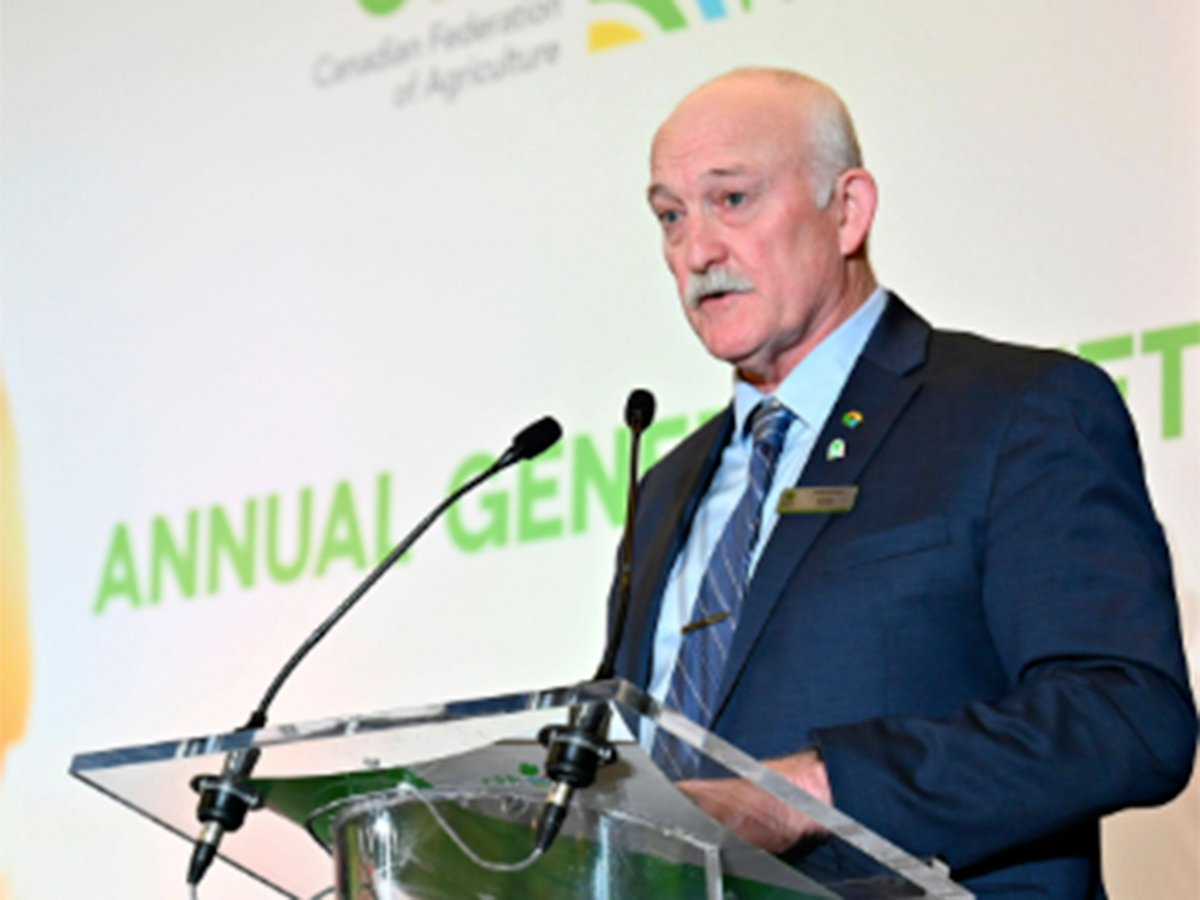OTTAWA — The president of Canada’s largest farm organization says people are anxious about looming tariffs and other uncertainties.
Keith Currie said the Canadian Federation of Agriculture re-focused much of last week’s annual meeting agenda because of that environment.
Follow all our coverage of the tariffs situation here
Read Also

New coal mine proposal met with old concerns
A smaller version of the previously rejected Grassy Mountain coal mine project in Crowsnest Pass is back on the table, and the Livingstone Landowners Group continues to voice concerns about the environmental risks.
“We really pivoted much of our discussions that we had originally intended at the AGM because of not only the tariff threat but also what’s happening with our own government situation here in Canada,” he said after the meeting.
The unknowns are unsettling, he added.
U.S. president Donald Trump maintained he would impose tariffs on Canadian goods as of March 4, one day after the Western Producer’s press deadline. The Liberal Party of Canada is to choose its successor to prime minister Justin Trudeau on March 9. A federal election could come in early May, pollster Nik Nanos told the meeting.
“People are anxious, and they want to talk about it,” Currie said.
“More importantly they want to talk about, what is our reaction and how we defend ourselves.”
Editor’s note: When the tariffs took effect March 4 the CFA put out the following statement on the matter via social media:
Delegates discussed a resolution from the Ontario Federation of Agriculture that called on the CFA to work with the federal government to negotiate an exemption to U.S. tariffs for agricultural products, identify a targeted list of imported products for strong retaliatory tariffs and investigate how Canada could be the preferred supplier to other affected countries.
“It’s an attempt to be proactive and prepared in the face of impending tariffs,” said OFA delegate Clint Cameron.
Colin Hornby from Keystone Agricultural Producers said Manitoba agreed with 99 percent of the resolution but believed asking for an exemption was counter to the approach Canada has been taking.
“We don’t want to let the Americans push us into fighting each other,” he said, while moving an amendment to remove the exemption call and instead ask the U.S. to continue to respect rules under the Canada-U.S.-Mexico Agreement.
Delegates agreed to that, as well as another amendment calling on Ottawa to provide financial help to farmers affected by the tariffs.
Martin Caron, from the Union des Producteurs Agricoles, is on the prime minister’s Council on Canada-U.S. Relations. He said every sector is asking for help and asked to add the clause to the original resolution.
Currie said the resolution as passed is about making sure CFA looks out for all of agriculture.
“We’ll certainly be sitting down and talking with respective commodity organizations,” he said.
“We also have to wait and see what actually comes out of the tariff list, if there’s anything. When that happens, we’re going to have to obviously go to government and say, ‘OK, we can absorb some of this, but what is it you can do to help us?’ ”
Short-term solutions such as increasing the interest-free portion of the Advance Payment Program can help, but Currie suggested there are also tax tools that could be used while industry and government work toward longer-term solutions.
A resolution submitted by SM-5, the supply managed organizations, asked CFA to lobby to ensure rules-based trade agreements are upheld and that Canada preserves its authority to define its own productions systems. It also called on the CFA to lobby for no further market access concessions for supply managed commodities.
That resolution was tabled for board consideration.
Currie said that type of conversation should be had in-house, considering the divisiveness that arose from discussion in the last Parliament over Bill C-282, which would have protected supply management from further trade concessions.
“I don’t know that airing dirty laundry in public, especially to non-members and our corporate sponsors, would do the resolution justice,” he said.
Also tabled was a resolution from Dairy Farmers of Canada regarding how Health Canada and the Pest Management Regulatory Agency handle industry-led research. The motion said the agencies routinely disregard evidence from industry research because of funding sources.
Meanwhile, KAP president Jill Verwey is the new CFA first vice-president. She takes over from Saskatchewan’s Todd Lewis, who is now a senator.
She said she was looking forward to being on the executive after a couple of years on the board and working with other industries, particularly on the trade front.
“Every year it seems like there is a different challenge to step up to,” she said.
“It’s a new role, with new responsibilities. It’s very important for that ag voice to be there.”
Stephanie Levasseur from UPA is the new second vice-president, taking over from Pierre Lampron. She said agriculture must carry a strong united voice in these unsettled times, and she pledged that CFA would leave no one behind.
Contact karen.briere@producer.com


















